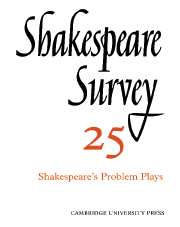Book contents
- Frontmatter
- The Problem Plays, 1920–1970: A Retrospect
- ‘Sons and Daughters of the Game’: An Essay on Shakespeare’s ‘Troilus and Cressida’
- The Options of the Audience: Theory and Practice in Peter Brook’s ‘Measure for Measure’
- Man’s Need and God’s Plan in ‘Measure for Measure’ and Mark iv
- The Design of ‘All’s Well That Ends Well’
- Directing Problem Plays: John Barton Talks to Gareth Lloyd Evans
- The Queen Mab Speech in ‘Romeo and Juliet’
- ‘Time’s Deformed Hand’: Sequence, Consequence, and Inconsequence in ‘The Comedy of Errors’
- Faith and Fashion in ‘Much Ado About Nothing’
- ‘The Merry Wives of Windsor’ as a Hallowe’en Play
- ‘The Tempest’ at the Turn of the Century: Cross-Currents in Production
- Variations Within A Source: From Isaiah XXIX To ‘The Tempest’
- The Life of George Wilkins
- A Neurotic Portia
- Of an Age and for All Time: Shakespeare at Stratford
- The Year's Contributions to Shakespearian Study 1 Critical Studies
- 2 Shakespeare’s Life, Times, and Stage
- 3 Textual Studies
- Index
- Plate section
A Neurotic Portia
Published online by Cambridge University Press: 28 March 2007
- Frontmatter
- The Problem Plays, 1920–1970: A Retrospect
- ‘Sons and Daughters of the Game’: An Essay on Shakespeare’s ‘Troilus and Cressida’
- The Options of the Audience: Theory and Practice in Peter Brook’s ‘Measure for Measure’
- Man’s Need and God’s Plan in ‘Measure for Measure’ and Mark iv
- The Design of ‘All’s Well That Ends Well’
- Directing Problem Plays: John Barton Talks to Gareth Lloyd Evans
- The Queen Mab Speech in ‘Romeo and Juliet’
- ‘Time’s Deformed Hand’: Sequence, Consequence, and Inconsequence in ‘The Comedy of Errors’
- Faith and Fashion in ‘Much Ado About Nothing’
- ‘The Merry Wives of Windsor’ as a Hallowe’en Play
- ‘The Tempest’ at the Turn of the Century: Cross-Currents in Production
- Variations Within A Source: From Isaiah XXIX To ‘The Tempest’
- The Life of George Wilkins
- A Neurotic Portia
- Of an Age and for All Time: Shakespeare at Stratford
- The Year's Contributions to Shakespearian Study 1 Critical Studies
- 2 Shakespeare’s Life, Times, and Stage
- 3 Textual Studies
- Index
- Plate section
Summary
One of our most skilful actresses – Stratford’s Portia of 1971 – has suggested informally that Shakespeare wrote comedies, tragedies, histories, and The Merchant of Venice. For her the play’s ‘problem’ is that it has no attractive characters – not even Portia. (How, then, can it be so popular?)
What a far cry from the sunny sounds of another person of the theatre, writing in 1930:
The Merchant of Venice is the simplest of plays, so long as we do not bedevil it with sophistries . . . Logic may land us anywhere.. .It is as smoothly and completely successful, its means being as well fitted to its end, as anything Shakespeare wrote.
The Merchant is surely more of a problem play than Granville-Barker allowed. It is, as Auden calls it, one of Shakespeare's Plays Unpleasant. We have no easy way, for example, round the problem of Shylock. But it is doubtful if the marriage of Portia and Bassanio was the problem for Shakespeare that it becomes in this Stratford production by Terry Hands.
Portia is generally regarded as one of Shakespeare's most attractive and admirable women. Jessica says of her, though not at Stratford:
Why, if two gods should play some heavenly match, And on the wager lay two earthly women, And Portia one, there must be something else Pawned with the other; for the poor rude world Hath not her fellow.
(iii, v, 74-8)- Type
- Chapter
- Information
- Shakespeare Survey , pp. 153 - 160Publisher: Cambridge University PressPrint publication year: 1972
- 1
- Cited by



